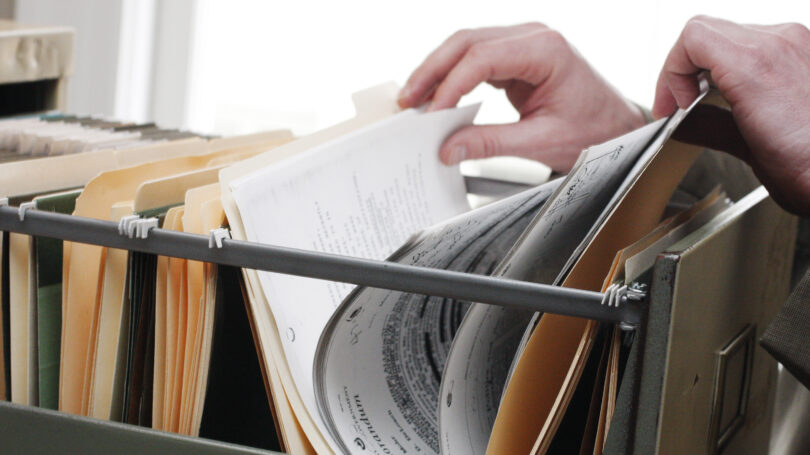Each year, the ordeal of gathering the necessary information to complete and file your tax return seems increasingly difficult, doesn’t it? This problem may be alleviated by implementing an efficient home filing system.
But completing your annual taxes isn’t the only reason to have a good filing system in place. It’s crucial to retain receipts to show how much you paid for property and investments, as well as to prove when the purchases were made. It’s nearly impossible to get a loan without disclosing records of your income and spending.
Keeping track of paperwork is a necessity, and it can cause problems for those who are unprepared and disorganized. However, creating a home filing system that makes sense can be quite simple.
Setting Up a Filing System
If you haven’t yet converted to a paperless system of storing documents, you can still easily manage a system to keep track of all your records.
1. Purchase Necessary Supplies
Visit your favorite office supply store and make the following purchases:
- One letter-sized pocket file that expands to three and a half inches (approximately $3)
- Several file folders (less than $1 each)
- Labels for your file folders (approximately $3 for a pack of 250 labels)
2. Create Labels
Label the expanding folder for the year. Then, create a label for each file folder as follows:
- Personal expenses, such as clothing, books, groceries, and entertainment
- Medical/dental
- Utility bills
- Large purchases and home improvements
- Bank statements
- Investments
- Credit card statements and receipts
- Pay stubs
- Tax records
3. Organize Your Documents and Files
Once you have your folders labeled, start organizing your filing system. As the year progresses, you can add more folders to hold receipts for new categories that you need to keep track of, such as expenses for education, pets, or travel.
Place your file folders inside the expanding folder, and keep your filing system securely tucked in a drawer or filing cabinet. Whenever you make a purchase or a bill payment, make it a habit to immediately place your receipt in the appropriate folder.
To help stay on top of bill payments, create a folder labeled “Bills to Pay.” Keep this folder in a highly visible location so that you are reminded to go through it regularly to pay your outstanding bills. After paying each bill, place the record into the appropriate folder in your filing system.
You should also create a folder labeled “Needs Attention.” For instance, if you need to make an inquiry regarding a suspicious charge on your credit card, or if you need to contact a vendor that didn’t give you credit for having paid your most recent bill, you should keep a record or reminder in this folder.
 Daily Filing Method
Daily Filing Method
By implementing this system, you can reduce the time you spend searching through scattered papers by having your files arranged in organized, appropriately labeled files. Create a daily routine to keep your files consistently and properly maintained:
- Collect the mail and go through it at your desk or kitchen table.
- Open each piece of mail and set aside junk mail and envelopes to be recycled.
- Place bills in your “Bills to Pay” folder.
- Place receipts in their proper folder. For example, medical services summaries should be put in your “Medical/Dental” folder.
- Anything that needs immediate attention should go into your “Needs Attention” folder so that you can take care of it quickly.
What to Keep and for How Long
In most cases, you should keep records for at least three years, as the IRS typically searches three years into your history during a tax audit. However, the IRS may choose to search an additional three years into your history, so for that reason it’s advisable to save records for six years.
Here are some records you should keep for six years:
- Receipts for any deductions that you listed on your tax return
- Brokerage statements for transactions reported on your tax return
- Records relating to the sale of a home or other property reported on your tax return
- Records of income and expenses reported for your small business on your tax return
Every piece of paper that supports information reported on your tax return should be saved for the six years following the date you filed.
However, there are some records you will want to keep forever:
- Tax returns
- Contracts
- Property deeds and closing statements
- Records of your contributions to your retirement plans
- Life insurance policies
- Estate planning documents, such as a power of attorney or trust agreements
Paperwork to Discard
After you’ve completed your tax return for the year, there is some paperwork that can be discarded. Unless it relates to your tax return, you should be able to get rid of following items:
- Bank deposit slips and ATM receipts
- Paycheck stubs
- Utility cable bill receipts
Final Word
There’s no time like the present to start organizing your paperwork. The sooner you set up an organized filing system, the sooner you can reap the rewards of a de-cluttered home or office. You may also find it much easier to access any paperwork or record anytime you need it.
Do you use a home filing system? What strategies have worked well for you?
